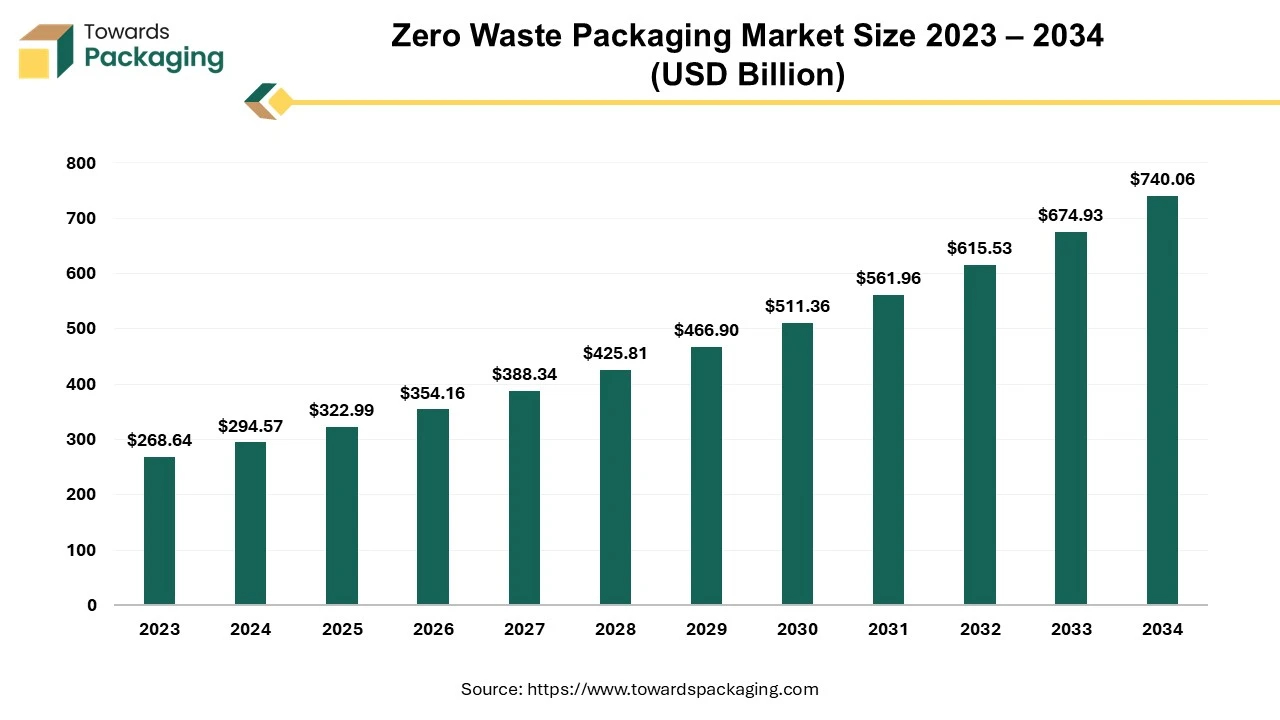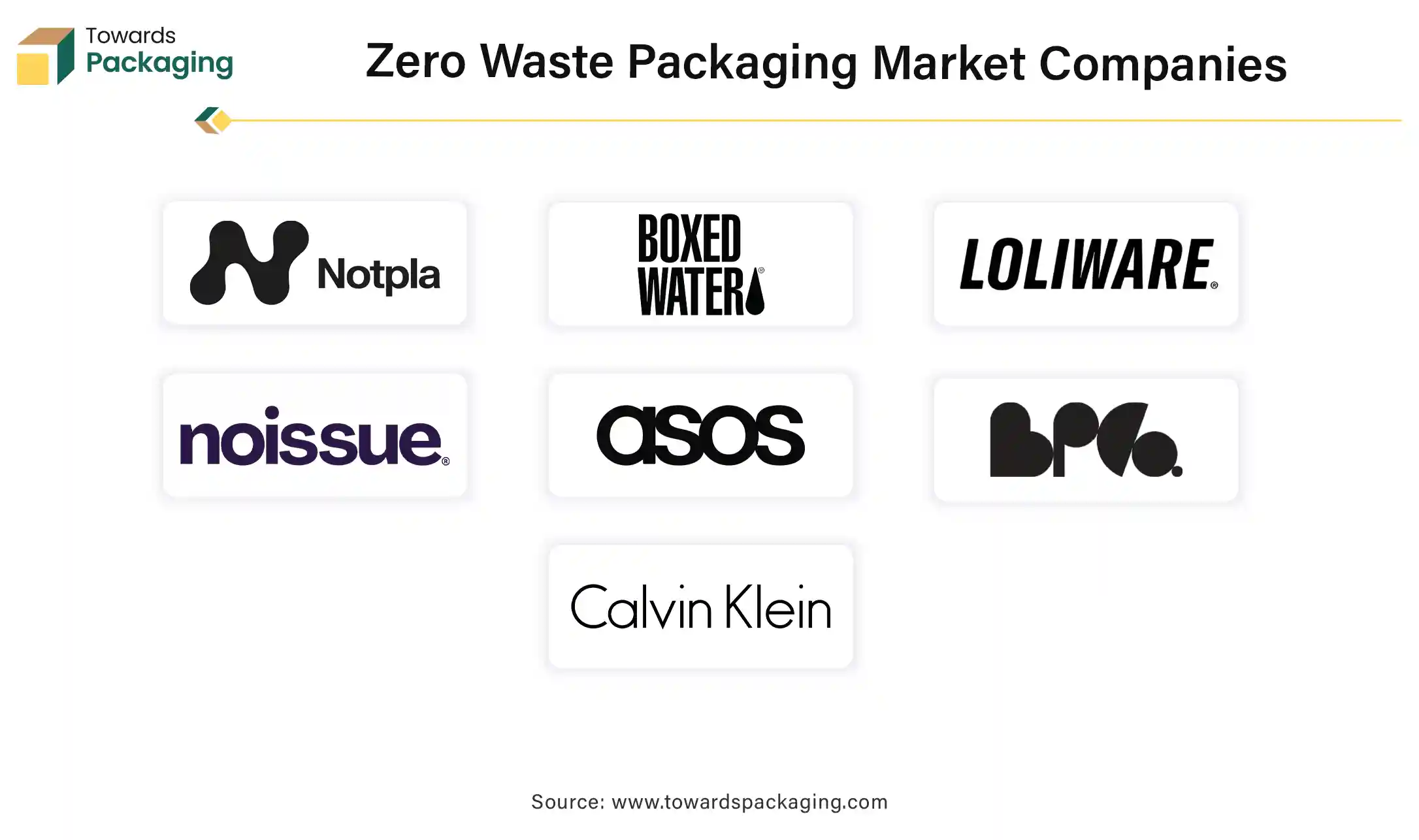April 2025
The zero waste packaging market is projected to reach USD 740.06 billion by 2034, expanding from USD 322.99 billion in 2025, at an annual growth rate of 9.65% during the forecast period from 2025 to 2034.

This market is proliferating due to the rising concern for sustainable packaging and economical solutions for packaging several products in almost every sector such as food & beverages, pharmaceuticals, e-commerce, and many others. The zero-waste packaging market is also rising due to the continuous effort of market players to reduce carbon emissions and produce environment-friendly packaging products.
Zero waste packaging means recycling and reusing materials for packaging purposes such as using glass milk bottles or any other glass bottles several times repeatedly resulting in reduced wastage of raw materials. The growing concern among consumers regarding eco-friendly packaging of products raises the demand for zero waste packaging. The major motive is to reduce the quantity of waste materials going to landfills and decrease environmental pollution. Government strict rules for packaging industries also influence market players to develop such products that can be recycled multiple times.
The growing awareness among people for the disposal of packaging waste with proper segregation is contributing towards the rise of the growth of the zero waste packaging market. The major market players are focusing on developing products that can be recycled, reused, biodegradable, and should be environmentally friendly in several ways. The continuous contribution of market players to developing edible packaging, biodegradable wrappers, and plant-based plastics. The market is anticipated to grow rapidly during this predicted period as the packaging sector is introducing innovative solutions regularly.
There is a huge upsurge in the demand for recyclable and reusable packaging products in all sectors which influences the growth of zero waste packaging industry. These are cost-effective along eco-friendly which makes them preferable for a wide range of market players. The production of recyclable materials is a cost-effective packaging solution for companies as these require less energy consumption and labour charges for manufacturing these products which ultimately reduces the costs. Usage of organic products such as corn and mushrooms for the production of packaging materials. The market is observing continuous progress and improvements in plans and materials that can lessen the possible threat of eliminating secondary packing. Numerous producers are shifting in the direction of nominal packaging and substituting plastic packaging with glass, paper, wood, and many other sustainable and biodegradable materials.
Rising demand for eco-friendly packaging products due to growing awareness among people towards environmental issues. As the adverse effect of plastic is rising significantly governments as well as customers are trying to adopt methods that can help to lessen such adverse impacts. The rising popularity of the circular economy enhanced the market potential by introducing materials and products that can be recycled reused, and biodegradable which help to reduce waste quantity in landfills. Governments worldwide apply strict regulations and supervision to decrease single-use plastics practices, this has compelled market players to use products that can be recycled and adopted by almost all sectors.
Asia Pacific witnessed the highest revenue share for the year 2024 this growth is due to the presence of several small to medium levels of industries and the increasing demand of customers for eco-friendly packaging of products. As such companies are highly focused on producing packaging products made up of cardboard or paperboard that can be discarded or recycled easily. This promotes the industry to grow rapidly by fulfilling both the demand of the customers as well the government policies associated with the packaging industry. In several countries such as India, Japan, China, South Korea, and Thailand this zero waste packaging sector is expanding rapidly. The innovative packaging solutions incorporated by the e-commerce industry have supported the market to develop exponentially.
Europe is estimated to grow at the fastest rate over the forecast period. The growing awareness among people regarding increasing environmental issues and knowledge of preventive measures has influenced this market. Funding from the government and other private firms to develop an eco-friendly packaging solution has supported the market players present in this region to develop the market by fulfilling customers' demands. Several companies collaborating to develop such solutions and reduce single use of plastic. Due to the rising demand major companies are choosing such materials for packaging are using recyclable and biodegradable materials to enhance their brand value.
By material type, the paperboard and cardboard segment led the zero waste packaging market in 2024. This segment is growing significantly as this is highly preferable as an eco-friendly packaging solution and adopted by several brands.
By outlook type, the reusable/ recyclable segment led the zero waste packaging market in 2024. This segment is in high demand as it is a sustainable method of packaging products in all sectors.
By distribution type, the online segment led the zero waste packaging market in 2024. This segment is growing significantly due to the rising trend of online purchasing products. The presence of a wide range of products on the online platform has increased this sector.
By application type, the food & beverages segment led the zero waste packaging market in the predicted period. The food & beverages sector widely uses glass or metal products for packaging purposes which led to zero wastage in packaging.

By Material Type
By Outlook Type
By Distribution Channel Outlook
By Application
By Region Covered
April 2025
April 2025
April 2025
April 2025